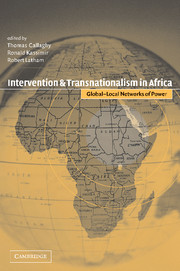Book contents
- Frontmatter
- Contents
- List of contributors
- Preface
- List of abbreviations
- 1 Introduction: transboundary formations, intervention, order, and authority
- Part I Historical dimensions and intellectual context
- 2 Networks, moral discourse, and history
- 3 Authority, intervention, and the outer limits of international relations theory
- Part II Theoretical frameworks
- Part III Transboundary networks, international institutions, states, and civil societies
- Part IV Political economies of violence and authority
- Part V Conclusion
- References
- Index
2 - Networks, moral discourse, and history
Published online by Cambridge University Press: 18 December 2009
- Frontmatter
- Contents
- List of contributors
- Preface
- List of abbreviations
- 1 Introduction: transboundary formations, intervention, order, and authority
- Part I Historical dimensions and intellectual context
- 2 Networks, moral discourse, and history
- 3 Authority, intervention, and the outer limits of international relations theory
- Part II Theoretical frameworks
- Part III Transboundary networks, international institutions, states, and civil societies
- Part IV Political economies of violence and authority
- Part V Conclusion
- References
- Index
Summary
This chapter is a historian's reflection on connections across time and space and on the relationship of those connections to what is imaginable politically. Fifty years ago, to take one example, a colony was a perfectly ordinary political structure. Before the nineteenth century, slavery was a normal social category. Colonization and slavery are no longer politically imaginable; they have been consigned to the past. It took a great deal of work over many decades to make it that way, not least the mobilization of geographically dispersed movements. Colonized people and slaves certainly played crucial roles in their own liberation, but not simply by acting within their categories. And if the movements involved elite emancipators seeking to keep their privileges while purifying their societies of well-defined evils, they did not have the power to define issues as they would, or to maintain the boundaries of debate across time and space. Antislavery and anticolonial movements were not organizations of the already like-minded, but rather intersections of different sorts of people with different sorts of motivations and interests, whose overlapping viewpoints crystallized around particular ways of framing an issue. But if slavery or colonialism became unimaginable, other forms of exploitation, humiliation, and abuse did not. These movements were extensive, but not global, and if they developed moralistic discourses in universalistic language, the universe was in fact particular, with its own set of inclusions and exclusions.
- Type
- Chapter
- Information
- Intervention and Transnationalism in AfricaGlobal-Local Networks of Power, pp. 23 - 46Publisher: Cambridge University PressPrint publication year: 2001
- 8
- Cited by



